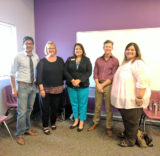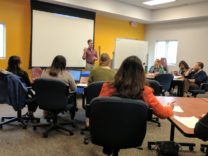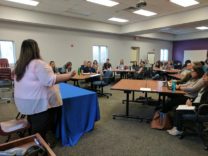Austin faces challenges in creating a community where all children and families have the opportunity to succeed. Social mobility in the U.S. is significantly lower than in most developed countries (about 8% compared to 11% in Denmark and 13% in Canada) (Corak, 2013) and in Austin we’re behind two-thirds of metro areas in the U.S in economic mobility. To extend opportunities to all kids regardless of zip code, we need to look at how we can help children and parents, together.
That’s why United Way for Greater Austin (UWATX) and our partners are diving head first into cultivating 2-Gen programming in Austin. “2-Gen” refers to two generations. It’s a paradigm for the coordinated approach to services, policies and systems that addresses the needs of low-to-moderate income children and their parents. In Austin there are individual programs addressing parents’ economic opportunities from workforce to post-secondary education, children’s education and especially high quality early childhood education, and the wrap-around support to make the impact lasting, but few have put them together in an intentional, intensive, coordinated way, yet.
We want to impact families of all kinds, but we know that families with young kids are uniquely poised to benefit from 2-Gen interventions. Research shows that increases in a parent’s education or income during the first few years of a child’s life have a powerful effect on a child’s development (Chase-Lansdale & Brooks-Gunn, 2014; Kaushal, 2014; Sommer et al., 2012). In addition, high quality early childhood education programs provide a safe, nurturing place for children making it easier for parents to attend school (Sommer et al., 2012) or enter the workforce (King et al., 2011). As a result, by combining and coordinating services for two-generations, we can give both parents and their children a better chance to succeed.
Our vision for 2-Gen in Austin is a diverse, coordinated ecosystem of quality services intentionally meeting the needs of both generations and providing opportunities for our community to address our community’s challenges to economic mobility. But what does it look like on the ground? Right now the heart of 2-Gen in Austin are those entities already serving the community – the nonprofit, local government and community programs in tune with the needs of parents, children and families. This is the ground that 2-Gen-in-action was built upon and why the 2-Gen Network was established. With the momentum of two dozen community partners, UWATX has had the opportunity to convene quarterly meetings to support, highlight and advance the 2-Gen approach for whole families.

Last week we hosted our 2-Gen partners at United Way to discuss how early childhood-parenting programs can build bridges to workforce opportunities for parents, while children simultaneously benefit from essential early learning experiences in a responsive environment. This model includes removing the barriers of transportation for that family. The idea is to bring our services closer together, strive for higher quality and thereby make it possible for a child to be ready for kindergarten and for parents to finish their education, take the next step beyond a job with unpredictable shifts or insufficient benefits and do better.
 .
. 
If you work at an Austin nonprofit program serving families and you’re interested in getting involved, contact us to learn more!
Or, sign up to learn how you can volunteer at one of our partner sites.
- Chase-Lansdale, Lindsay and Jeanne Brooks-Gunn (2014). “Two-generation programs in the Twenty-First Century,” The Future of Children, 24 (1), 13-40.
- Corak, Miles (2013). “Income Inequality, Equality of Opportunity, and Intergenerational Mobility,” Institute for the Study of Labor.
- Kaushal, N. (2014). “Intergenerational payoffs of education.” The Future of Children, 24 (1), 61-78.
- Sommer, Teresa Eckrich et al. (2012). “Early Childhood Education Centers and Mothers’ Postsecondary Attainment: A New Conceptual Framework for a Dual-Generation Education Intervention,” Teachers College Record 114 (2012): 1–40.
- King, Christopher T., Tara C. Smith, and Robert W. Glover (2011). Investing in Children and Parents: Fostering Dual- Generation Strategies in the United States. Austin, TX: Ray Marshall Center for the Study of Human Resources, LBJ School of Public Affairs, The University of Texas. Prepared for the Fall 2011 APPAM Policy Research Conference, Washington, D.C., November.
